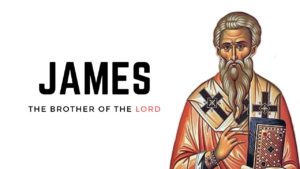To hear the message of Day 6 in the James series, "Listening & Looking" (15 mins), click the play arrow below.
The next two sections in James (today’s offering plus tomorrow’s) introduce 5 key themes in swift succession:
- Restraint of hasty desire
- Practical obedience to God’s Word
- Reception of the Word with humility
- Concern for defenseless members of the community
- Turning from the ways of the world
1:19-21
- “There are four types of disciples: swift to hear and swift to lose—his gain is canceled by his loss; slow to hear and slow to lose—his loss is canceled by his gain; swift to hear and slow to lose—this is a happy lot; slow to hear and swift to lose—this is an evil lot” (’Avot 5:12).
- Not seeking justice through politically motivated violence (v.20).
- “Impostors and demagogues, under the guise of divine inspiration, provoked revolutionary actions and impelled the masses to act like madmen” (Josephus, Jewish War 259).
- There were numerous first century revolutionaries, e.g. the Samaritan who led a band of followers up Mt. Gerizim; Theudas, who put himself forward as a second Moses; and the Jewish prophet who portrayed himself as a second Joshua, prophesying the collapse of Jerusalem’s walls.
- Such revolutionaries, and those who sided with them, constituted an implicit threat to the Sadducees. (They would not have appreciated James.)
 “Put off” (v.21) – baptismal context (clothes).
“Put off” (v.21) – baptismal context (clothes).- The implanted word – see Jer 31:33. God’s word is powerful; it changes lives.
1:22-25
- James is Wisdom Literature.
- Mirror analogy:
- Many do not spend time in the Scriptures because they don’t like the image of themselves they see there. Of course the Word makes us look better—not in external appearance, but at the heart level.
- Perhaps the mirror is connected with seeing ourselves as the image of God. Our look into the mirror requires more than a cursory look. Slow down, let the truth sink in.
- Doers – this word appears several times in James. Obedience.
- He who knows not and knows not that he knows not—he is a fool; avoid him / He who knows not and knows that he knows not—he is simple; instruct him / He who knows and knows not that he knows—he is asleep; awaken him / He who knows and knows that he knows—he is wise; follow him (an old Arab proverb).
- Teleios 5x in James…. Suggests character, not mere actions
- Why the “perfect law that gives freedom” probably isn’t the N.T.:
- See Ps 1:2; 19:7-11; 40:6-8; 119.
- Rebirth through the Word (1:18).
- The perfect law seems to be the same thing as “the implanted word” (v.21).
- In James, Gospel and "law" are more or less interchangeable.
- Perfect / mature – 1:4; 3:2, 17-18.
- 2:8—Perfect law is recast as “the sovereign law” of love to one’s neighbor.
- This is certainly not the New Testament—which wasn’t even written yet. (James died in 62; by that time, the only parts of the NT already written would have been 15 or 18 of the epistles.)
- Thus there is no direct connection with 1 Cor 13 (“when the perfect comes”).
- Freedom
- Not political freedom, nor economic freedom, but spiritual freedom.
- God’s perfect law brings freedom – obedience (think RR tracks).
Next reflection: Pure Religion








